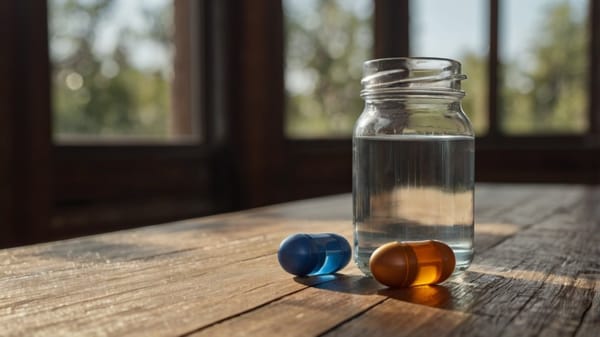Feel Heavy After Meals? This Stack Helps Things Move
Feel weighed down after meals? This simple supplement stack helps digestion move smoothly—so you feel lighter, clearer, and more energized.

Ever feel like your food just… stalls? You eat a normal meal, but it lingers like a brick in your stomach. That sluggish, stuck feeling isn’t just annoying—it slows you down mentally and physically.
If your digestion regularly feels off, it’s not something to ignore. The good news? You don’t need a cleanse. Just a few smart additions to your routine can help your gut get back in sync and make meals feel light again.
Why You Feel Bloated or Sluggish After Meals
That heavy feeling isn’t all in your head. When digestion stalls, food lingers in the stomach and intestines longer than it should. The result? Gas buildup, slow transit time, and that uncomfortable post-meal weight.
This happens more often than people realize—and it’s usually triggered by:
- Eating too quickly or while distracted
- Low stomach acid or enzyme activity
- Gut bacteria imbalances from stress, antibiotics, or processed foods
- Not moving enough throughout the day
The fix isn’t about restriction. It’s about giving your digestion what it needs to do its job well—so you can eat, feel satisfied, and move on with your day.

The Gut-Support Stack That Helps You Feel Lighter
Here’s a simple, daily supplement stack that supports smoother digestion—no gimmicks, no extremes. Just real, steady results.
1. Digestive Enzymes — Help Your Body Do the Work
When you eat, your body produces enzymes to break food down into nutrients. But modern meals (and modern stress) can blunt that process.
Digestive enzymes—especially those that target protein and fats—can help relieve that post-meal pressure by speeding up breakdown and absorption.
They’re especially helpful if:
- You feel heavy after rich meals
- You notice visible food particles in stool
- You burp or feel full for hours after eating
How to use it: Take a capsule right before or with your heaviest meal of the day. It works best when timed with food, not after.
2. Probiotics — Balance the Bacteria That Keep You Regular
Your gut isn’t just about food—it’s home to trillions of microbes that help you digest, eliminate, and regulate inflammation.
When these microbes fall out of balance (thanks to stress, diet, or antibiotics), digestion slows and bloating creeps in.
Probiotics help repopulate your gut with good bacteria that keep things moving consistently—not too fast, not too slow.
How to use it: Take first thing in the morning, before food, with a glass of water. Choose a formula with multiple strains, including Lactobacillus and Bifidobacterium.
3. Magnesium Citrate — Gently Gets Things Going
If you’re feeling backed up or bloated, this mineral is your quiet hero. Magnesium citrate draws water into your intestines to soften stool and promote smoother elimination.
It’s not a harsh laxative—it just helps restore regularity, especially if you’re someone who "forgets" to go for days at a time. Bonus: it also supports sleep and muscle recovery.
How to use it: Take at night, 200–400 mg before bed. Start small and increase only as needed.
What About Fiber?
Fiber is essential, but if you’re already bloated, adding a bunch at once can backfire.
Once your digestion is moving well with enzymes, probiotics, and magnesium, slowly increase your fiber through whole foods like chia seeds, flax, and leafy greens. Don’t forget to hydrate—fiber needs water to work.
Other Daily Habits That Keep Digestion Moving
Supplements do the heavy lifting, but small shifts in your daily routine make a big difference in how well they work.
Stay Hydrated (Seriously)
Your gut can't move waste without water. Most people walk around slightly dehydrated, and digestion pays the price. If you’re taking magnesium or eating fiber, hydration is even more critical.
Quick win: Start your day with a big glass of water and sip consistently through the day—not just when you’re thirsty.
Take a Post-Meal Walk
Moving your body—even just 5-10 minutes after a meal—stimulates your digestive system and encourages movement through the intestines. It also helps stabilize blood sugar and prevents the dreaded food coma.
Try this: Take your calls while walking or build a 10-minute walk into your lunch break.
Don’t Eat on Autopilot
Mindless eating leads to rushed meals, poor chewing, and digestive distress. Give your body a fighting chance: slow down, chew more, and eat without multitasking.
Not a lifestyle overhaul—just a little presence while you eat. Your gut responds better than you think.
What to Expect When You Stay Consistent
This isn’t a one-night miracle. But give it a week or two, and your body starts to shift. You’ll likely notice:
- Less bloating after meals
- More consistent, easy bowel movements
- Improved energy after eating
- A feeling of lightness and flow through the day
It’s not about doing everything perfectly—it’s about stacking small wins so your body feels supported instead of overloaded.
Final Thoughts: Get Back to Feeling Light and Energized
If digestion feels heavy, slow, or unpredictable, don’t just power through it. Your gut is sending signals—and it doesn’t take much to respond.
A simple daily stack with digestive enzymes, probiotics, and magnesium can help your system find its rhythm again. Pair that with a few daily habits, and you’ll feel the difference fast.
Start now. One capsule here, a glass of water there, and a short walk after dinner—that’s how momentum builds. Support your gut, and the rest of your body follows.




